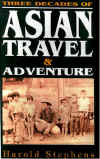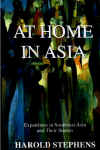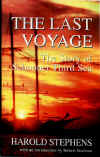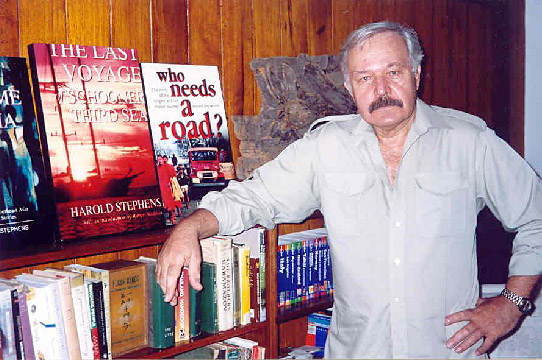Harold Stephens - A Modern Day Marco Polo
He has been a stand-in for Marlon Brando in Mutiny on the Bounty - you can catch a glimpse of him in the famous keelhaul scene. He met Ernest Hemingway. He's climbed the Matterhorn, most of the major peaks in North America and he even briefly joined forces with one of Sir Edmund Hillary's climbing teams. He was imprisoned by the Chinese Communists and escaped by swimming to a passing junk. He's driven a motorcycle across Australia, a jeep across Russia and hitchhiked and then driven a land cruiser around the world. He's sailed the major seas of the world. I mean, really, what hasn't Harold Stephens done? Indeed, shortly before James Clavell died he told Harold if he were to write a modern day saga he would base it on Harold's life.
During all this, Harold has found the time to write twenty books on his travels, and the people he has met, and he's working on three more - Travel Guide to the Chao Phraya, Take China and Return to Adventure (He has also completed a book on the artist Theo Maier, which he hasn't yet published because of the sensitive nature of its material.).
But how does Harold keep track of the people he meets and the places he goes? "Even when I am going into jungles, or when I'm sailing out at sea, I try to capture the moment because, you know, you can't always depend on your memory," he says. "So if I meet someone and I don't take notes, I'll go back immediately and sketch them - put them down into words. I keep a journal and even if I'm at sea and a storm is approaching, I try to capture the feeling right there at the time. Or if I'm sitting in a bar, or sitting in a street cafe in Paris, I write down everything that's happening: the people I see, the mood and the feeling. I think that's the important thing because when we try to recreate it we remember only the things we want to remember, we don't remember all the small details. I think this is the real secret to writing."
How about his interview process? "I'll go out and meet someone and sit down with them for two hours and I won't say anything. I let other people talk and I never argue with them. I'm out to capture people as they are, I just let them ramble."
Raised on a farm in Bridgeville, Pennsylvania, he had to play by myself. At school he was kicked around, he couldn't play ball, he couldn't shoot a basket, in fact, he was called a "sissy." So he would escape back to his farm and create a whole new world there by playing Tarzan and damming up rivers. He always thought he would make his revenge by coming back as a great hero and he attempted to do so by lying about his age and joining the USMC at age sixteen. The year before his farm had burned down and he had to quit school halfway through grade nine to go work in a coal mine.
In April 45, three months after he enlisted, Harold ended up in Okinawa, where he finished out the rest of the Pacific campaign. After being evacuated to Guam, the Marines shipped him to China, and along the way he picked up a book on spoken Chinese. So he started practicing phrases. Later, an officer hearing him yell expressions in Chinese, asked where he had learned to speak the language and Harold said he came from a missionary family. So the very next day, he was off to Peking on a six month course to study Chinese at the University of Peking so that he could become a translator.
As the Communists advance grew, Harold and a group of fellow marines were sent on a mission to rescue a group of nuns who ran an orphanage in the Laoshin Mountains but the nuns refused to leave. Unfortunately, on the way back, a number of the Marines were captured and killed by the Communists. They were hung up by their feet and their tongues were cut out. Luckily, the fact Harold spoke Chinese saved his life, but he was taken as a POW. First, he worked on a coal island lugging coal then he was assigned to work in a fishing village which eventually gave him the chance to escape by covering himself in grease, escaping and swimming to a Chinese junk.
Harold eventually made it to Shanghai and then back to San Diego where he faced a court-martial because the military had no idea what had happened to him. When everything was straightened away, he became part of a group of 200 Marines that were being sent to guard American embassies around the world.
In 1949, Harold went to Paris to work for the American Ambassador Jefferson Caffrey; he was his bodyguard. And meeting him was really the turning point in Harold's life. He would go everywhere with the Ambassador because someone had threatened Caffrey's life. The Ambassador encouraged Harold to go back to school and with his help he did. Stephens, with a reduced workload, enrolled at the Sorbonne and studied French and French history. He then preceded to enter Georgetown's School of Foreign Service where he managed to take a four year degree in two-and-a-half years by attending school day and night. The university was furious because Stephens only had a grade eight education but they had to enroll him because of the ambassador's recommendation.
While he was in Paris, Harold married a French-American girl. His recent novel, The Tower and the River, is really based on his life there except he changed his occupation: in the book, he's a jet pilot, he didn't want to be a lonely Marine.
Harold and his wife had two kids, and she ended up having her own thirty minute TV fashion show in Washington. He taught school and had aspirations about entering Georgetown Law School but he got into the foreign service instead - cloak and dagger stuff - with the National Security Agency. But, he grew disillusioned because he didn't like government and he didn't like the routine. Eventually, his wife fell in love with another man, so they divorced and she married into money.
Harold then decided to go traveling. He thought about settling in Spain, but in 1959 he settled for the ultimate haven - Tahiti, because he wanted a place where he could write. He got waylaid along the way, however, and ended up rafting down the Amazon River.
But when Harold left America, he hardly had any money, so how did he do it? "In 1960, I could live on US$150 a month, one could sail across the Pacific or Europe on a cargo boat for $US7 a day. You could get a cheap hotel in Singapore for US$3 a day, or in Tahiti for $2.50 a day (he says the cheapest they have today is a dormitory for US$60)."
On his adventures, Harold says: "It's not the doing it, it's the trying to work for it, that's the fun part of it. I have realized my shortcomings though. While training with Sir Edmund Hillary, I knew I would never become a great mountaineer, but it didn't matter, what mattered was just taking part in the adventure. "
What's next? "I have practically done everything there is to do, so I would like to do things over again. However, I would not like to ride a camel caravan across Afghanistan again, but I would like to outfit a 4WD and go across the Australian outback. I would like to sail the South Pacific again but not in a schooner, where you really have to work, that's why I'm heading toward a big mechanized boat. I want to see some of the islands and the people I knew. I want to get back into Tahiti, I want to do Tahiti in style this time and I would like to do a book on Tahiti. I met all the great ones that were living there in the 50s."
Thai pirates have a pretty nasty reputation, so how did Harold deal with them while sailing through Thai waters and when he was out at sea? Normally, he kept his boat dark colored so pirates didn't know who he was or what he was doing. He also reinforced his cabins, so they would be bulletproof. Women on board were not allowed on deck when unknown ships passed by and definitely not in any shorts or any provocative clothing. He says the best thing was just not to acknowledge what could be a pirate ship: never wave or show any bit of friendliness towards it.
If he was in a cove, and a number of Thai ships moved in, Harold would immediately lift anchor and move, and he just wouldn't invite them over to his boat, because once they got drinking Thai whiskey they could so easily get out of control. "As long as you are moving, you are relatively safe," he says. "And remember the other ships are worried about you too, they don't know what your capabilities are."
On his schooner, The Third Leg: "It became an emotional thing for me. I had complete, honest trust in that boat, I could do anything with it. It became so much of a living part of me and then when I wasn't there when it went down: I feel like I deserted it, because I could have saved it. When I went back to California, I left it with two people in Honolulu, and a hurricane came up and they left it with the portals open and it just went over and broke up."
"I'm not out to change the world but I do influence a lot of people, especially from my yachting book, The Last Voyage, where I literally get hundreds of e-mails and letters where people tell me they want to just chuck it all away, build a boat and sail around the world."
Harold is currently working on a new book called Take China, based on his experiences while serving there. He has an interesting slant on communism: "I think it was the best thing that ever happened to China. Something had to happen because the conditions were deplorable: graft, corruption, public executions, leprosy, and starvation. We were backing the wrong people, like Chiang Kai-shek, all the time."
In his amazing life Harold has mingled with Legong dancers and painters on Bali, rubber planters in Malaysia, cargo boat captains on the Rejang in Sarawak, Iban chiefs in Sabah, stone-age natives in Mindanao in the Philippines, holy men on the Ganges and negritos in the tropical rain forests of Malaysia.
He's seen the red sails of dhows on the blue-green waters of the Nile, the Taj Mahal by moonlight, the blazing Sahara sunsets, the majestic snow peaks of the Himalayas rising over the valley of Kathmandu.
So how can he do all these things?: "What the Marines taught me was that you can do anything. If it's there, you can do it. You can do everything you want to. Once, you get rid of this idea that you need money, you can do anything." Amen, keep on truckin' Mr. Stephens.
Harold Stephen's email: booking@inet.co.th
Website: www.wolfenden.com Email:wolfen@northcoast.com
Travel articles - Travel Thailand and Beyond, a series written by Harold Stephens for the Bangkok Post
Finis




